Benefits of a Company Intranet for Internal Communication

- Increased Productivity
- Improved Collaboration
- Enhanced Employee Satisfaction
- Facilitates Internal Communication
- Personalized User Experiences
- Builds a Community of Self-Service
- Connecting Across Locations and Time Zones
- Recognition and Rewards
- Boosts Employee Efficiency
- Comprehensive Content Management
- Cultivates a Culture of Workplace Happiness
- Improves Employee Engagement
- Simplified Implementation and Usage
- Mitigated Security Risks
- Seamless Integration


 Cut onboarding time
by 60%—here's the
Ultimate Checklist
that helped do it.
Cut onboarding time
by 60%—here's the
Ultimate Checklist
that helped do it.

Company intranets have been a part of corporate life since the mid-'90s. But in the last half-decade or so, they've evolved to include many social features and relationship-building capabilities. Naturally, the merit of these developments is hotly debated.
While we can all agree that strong company relationships are important, how these relationships are developed is a point of contention. Is social intranet software a productivity killer, or an important business tool?
In this blog post, we'll explore the main benefits an employee intranet provides, and whether or not your company should invest in this type of social intranet platform to enhance internal communications and foster a collaborative intranet team environment.
15 Benefits of Integrating a Company Intranet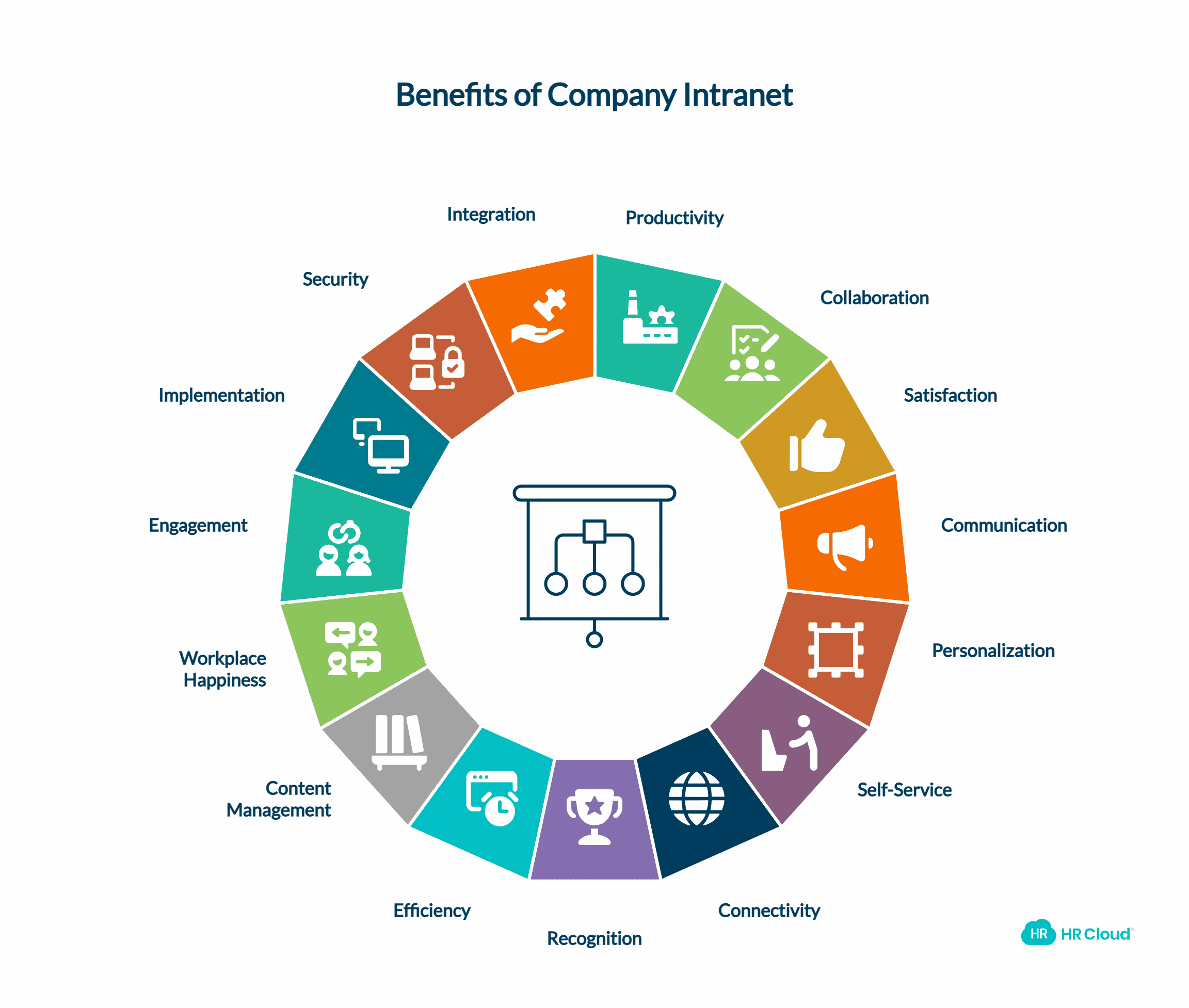
Wondering whether to use a company intranet platform or not? You're not alone. The topic has been picking up steam lately. Clear and concise internal communications are essential for any role in a business, and the quality of a company’s internal communication sets the stage for the future. Here are, in our opinion, the 15 biggest benefits:
1. Increased Productivity
It's easy to think that the availability of socializing or sharing personal information via social intranet may lead to distractions and decrease productivity. However, the reality is quite the opposite. The benefits of easier collaboration, efficient communication, and enhanced organization are far more important. Also, it should be noted that social intranet software allows for conversation monitoring. Making this known to employees will often discourage any inappropriate sharing without ruining company culture. In addition to serving as a central point of communication, the intranet ensures prompt distribution of key company updates and information, reducing employee search time and improving knowledge management.
2. Improved Collaboration
Email, for all its advantages, is not an ideal internal correspondence tool. Messages are easily lost, buried beneath a mountain of other emails.
Social intranets separate internal and external communications, allowing intranet team members to easily send large files when necessary and respond to each other in a more timely fashion.
Lastly, the community aspect of social intranet software encourages employees to share ideas in a transparent and streamlined way. Different thoughts and suggestions often make for better businesses. These collaboration tools foster a culture of knowledge-sharing and innovation within the organization.
3. Enhanced Employee Satisfaction
Employee satisfaction is an important component of any organization. Studies show that the average employee tenure at a company is a mere four years, and employee turnover costs businesses an average of six to nine months' salary per departed worker.
By implementing solutions like a social intranet with robust internal communications features, organizations can improve employee engagement and satisfaction, therefore reducing turnover rates. Studies have shown that 60% of companies found increases in employee engagement through intranet use.
4. Facilitates Internal Communication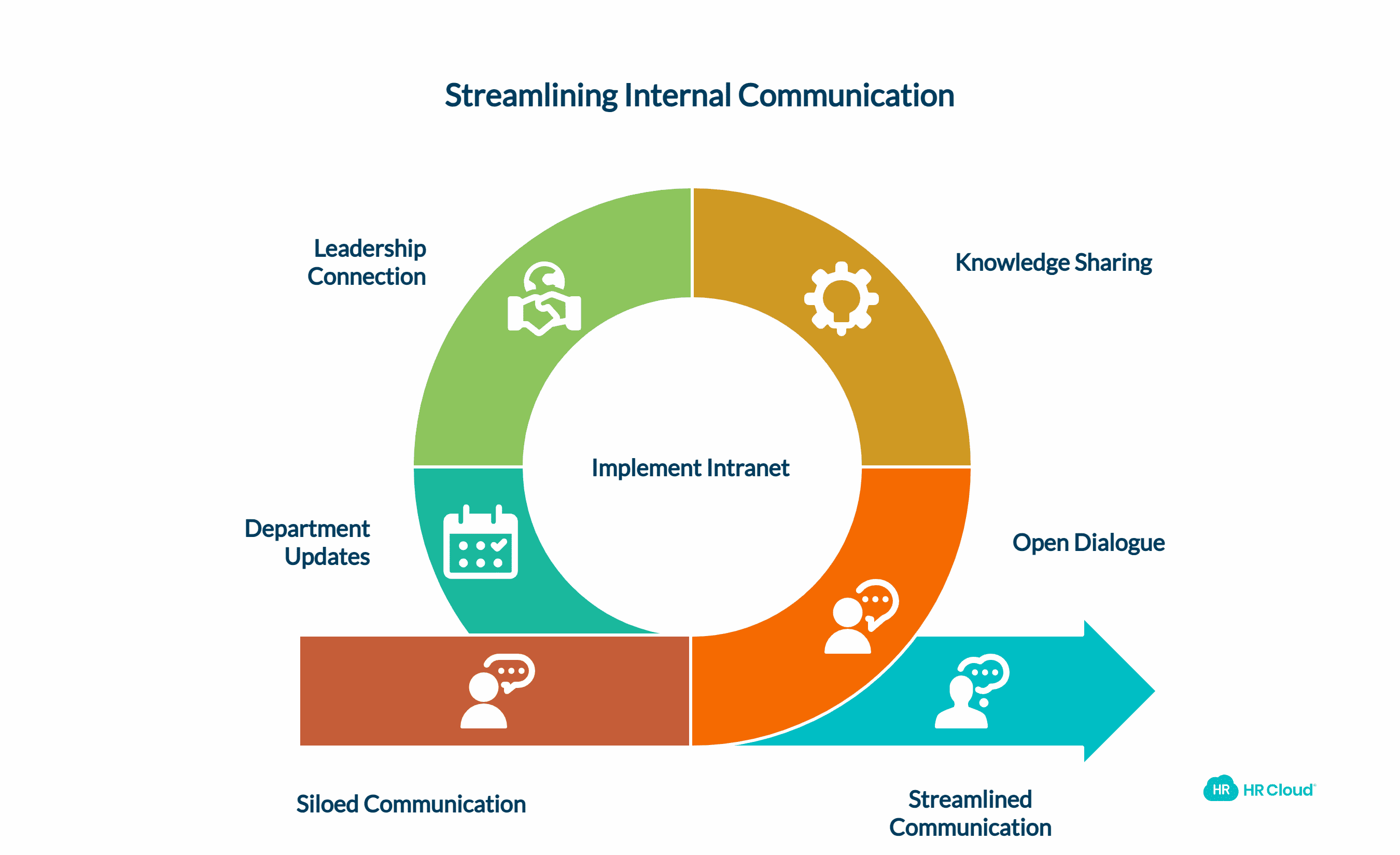
Effective communication is the foundation for success within any organization. An effective company intranet solution encourages communication to flourish across your organization:
-
Teams can have an open dialogue
-
Colleagues can share and contribute knowledge
-
Leadership (managers/supervisors) can stay in touch
-
Different departments can provide and share updates
-
The best part is that communication moves in both directions. Anyone can share, comment, and provide employee feedback. An intranet both streamlines communication by bringing it into one place and entrusts individuals with a voice and company knowledge.
It is important to note that intranets today not only facilitate information sharing between employees and the company but also encourage employees to collaborate and share information among themselves. These internal communications tools are essential for creating a cohesive and informed workforce.
5. Personalized User Experiences
Unlike traditional intranets restricted to a one-size-fits-all approach, modern social intranets customize channels, page content, and company portals based on employee roles, departments, or groups. Tailoring the intranet experience to individual employees according to relevant criteria increases their interest and engagement levels in the platform's information. This personalized user experience enhances the overall digital workplace, making it more efficient and enjoyable for employees to navigate and use.
6. Builds a Community of Self-Service
Previous approaches to company intranets were made up of collections of web pages and links to disparate documents and systems. Over time, documents would become outdated and links would be broken or expire, leading to frustration for employees and HR admins.
Modern intranets are designed from the ground up to be a repository of vital company information—secure, accessible, and easy to maintain. The community approach to sharing and managing information gives employees self-service access to the content and applications they need at any time and from anywhere.
Social intranet by Workmates takes the community a step further, making information easy to find with powerful search capabilities and easy to promote with viral content sharing from intuitive libraries and repositories. Plus, the integrated employee directory makes finding and sharing content with groups, teams, and individuals a snap.
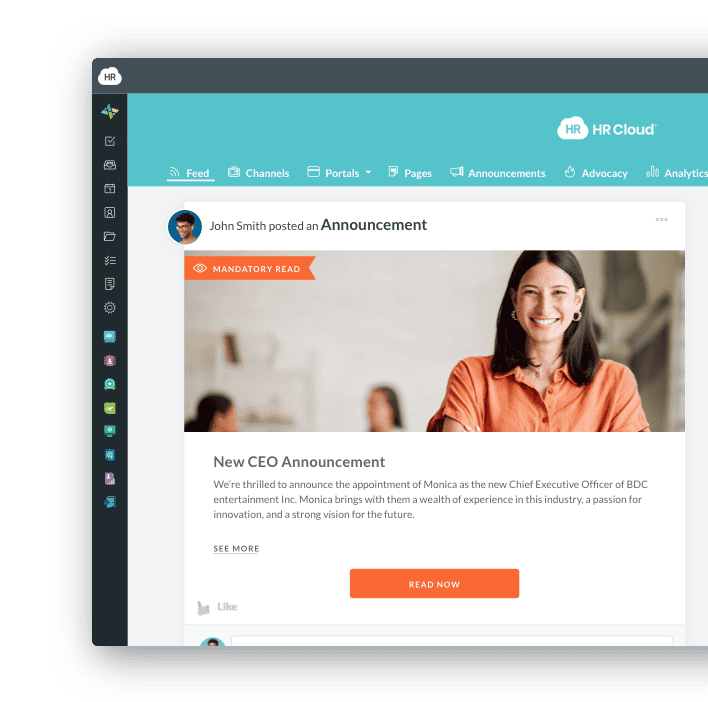
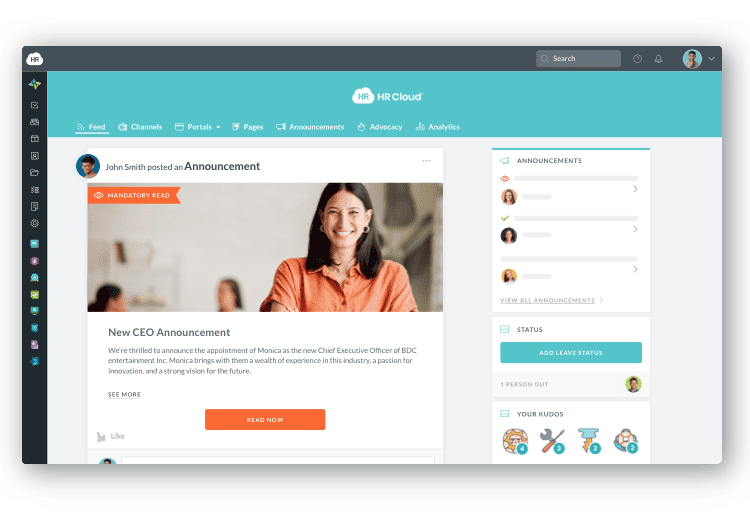
7. Connecting Across Locations and Time Zones
-
Globalization has led to an increase in organizations with remote workers or those who work across time zones. Companies now use intranets to connect remote employees, field-based teams, satellite offices, and any employee who may not be in the corporate headquarters, keeping everyone aligned and improving overall employee performance. By serving as the central online hub for the company, intranets provide insights to employees across locations, enabling seamless communication regardless of physical distance. This connectivity, available through desktop and mobile accessibility, ensures that remote intranet team members, field-based teams, and satellite offices can stay connected, leading to improved morale, productivity, and engagement.
8. Recognition and Rewards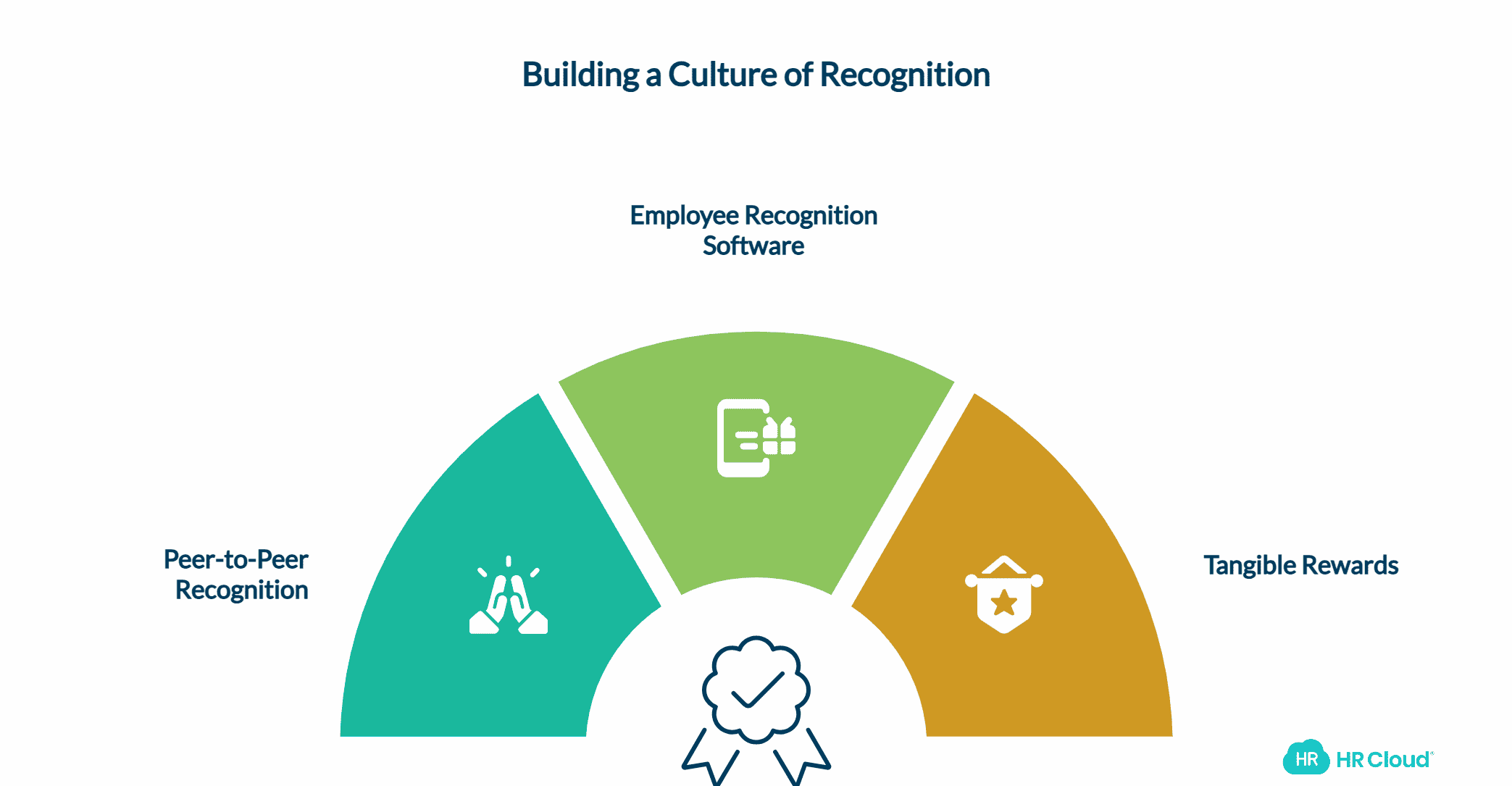
Employee recognition is a fundamental part of the employee experience, and it helps to improve employees’ engagement levels and overall satisfaction. According to the SHRM/Globoforce Employee Recognition Survey, effective peer-to-peer recognition is 35.7% more likely to have a positive impact on financial results than manager-only recognition.
Employee recognition software empowers every employee to recognize and be recognized on an equal playing field. Employees can recognize and be recognized on an equal footing, ranging from peer shoutouts to tangible rewards. This culture of appreciation and motivation enhances the overall employee experience and boosts morale.
9. Boosts Employee Efficiency
A unified communication system significantly enhances efficiency in the workplace. Nearly half of US workers prefer to communicate with their colleagues online, saving time and increasing productivity. Modern intranets eliminate the need for cumbersome email workflows, reducing time wasted on version control and confusion. By providing easy access to the latest documents and forms, intranets save valuable time and allow employees to focus on more strategic initiatives.
10. Comprehensive Content Management
Intranets serve as comprehensive repositories of essential company information, encouraging community-driven content sharing and management. This approach empowers employees with self-service access to vital information, ensuring they have access to necessary content and applications whenever needed. Modern intranets like Workmates enhance content management with search capabilities, intuitive content libraries, company announcements, and integrated employee directories, simplifying content discovery and sharing among groups, teams, and individuals.
11. Cultivates a Culture of Workplace Happiness
Amplify the office atmosphere and experience through increased employee recognition and engagement. A company is not a company without its people, and most intranets are about the people. Bringing them together, bringing out the best in them, and enriching your company culture in the process. Transform your organization with intranets that cultivate connections, nurture talent, and enrich the company culture, leading to increased retention rates and improved performance.
12. Improves Employee Engagement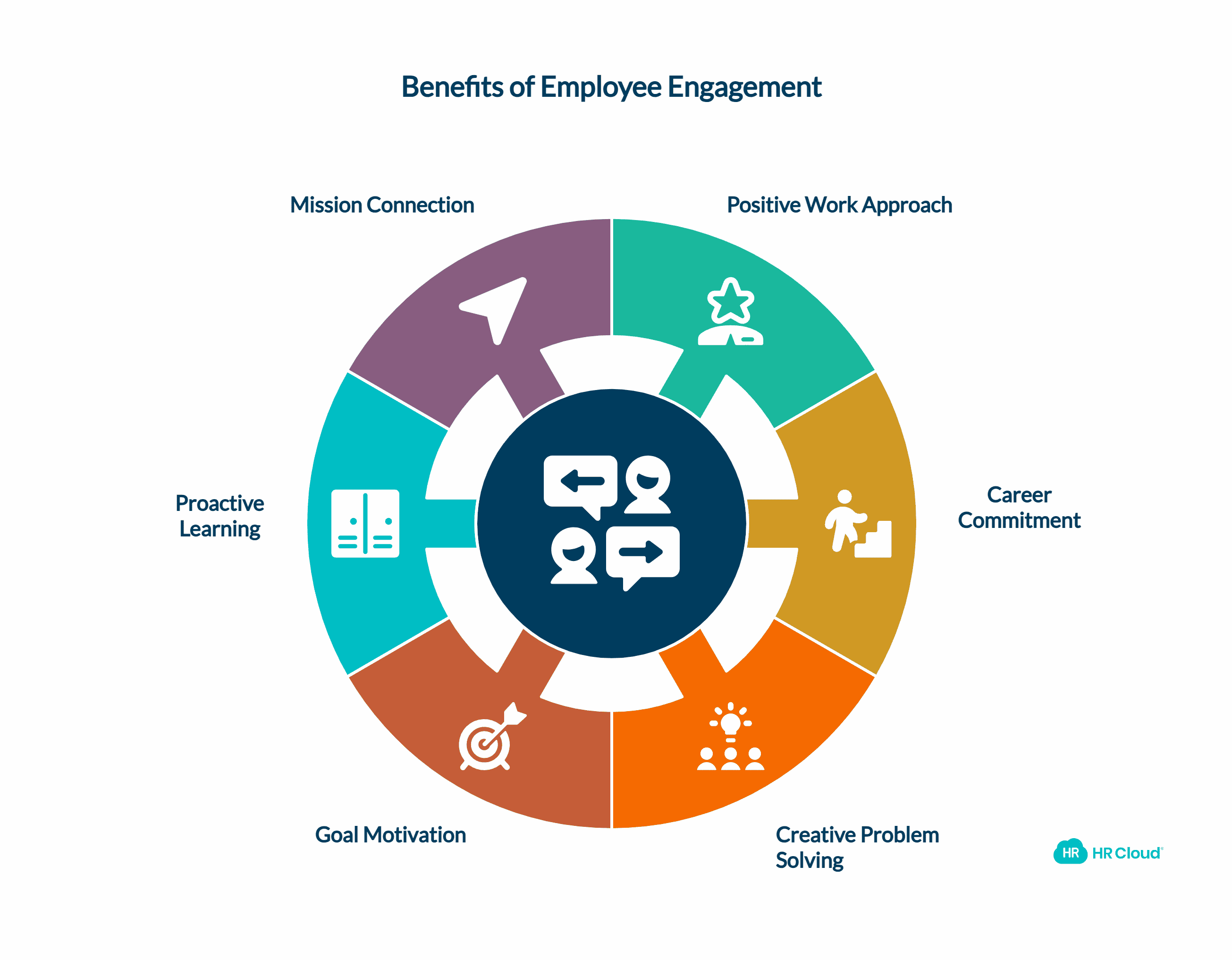
Fully engaged employees are far more likely to be satisfied, motivated, and committed to their work and company.
Overall, an engaged employee is more:
-
Positive in their work approach
-
Committed to developing and maintaining careers at their organization
-
Creative in solving problems
-
Motivated to meet and exceed goals
-
Proactive about learning new skills and starting new projects
-
Connected to the mission of the company
By incorporating social features such as likes, comments, and sharing, social intranets promote interaction and engagement among employees. Gitnux report shows that 74% of intranet users access their intranet daily, and this shows that the intranet can foster a sense of community and belonging, leading to higher employee morale and productivity. These features encourage employee participation and create a more dynamic and interactive digital workplace, facilitating seamless employee feedback and internal communications.
13. Simplified Implementation and Usage
-
Employees typically embrace social intranets because they mimic the same usability and features they are accustomed to with the social media sites they use every day. Like any new application, familiarity is critical to success and maximizing your company's investment. Training is significantly reduced as a barrier to adoption, and employees are more likely to revisit the intranet regularly to explore the tools and information available to them.
By offering centralized access to essential tools and information, social intranets drive collaboration and provide enhanced support by serving as engagement points for various department functions, like HR documents or IT support processes.
14. Mitigated Security Risks
-
It is crucial to address the security advantages provided by social intranets. Without an internal system for communicating and sharing important documents, employees will be forced to use other solutions such as Dropbox and Slack.
These are wonderful tools, but they aren't controlled by your company's IT department and may be more susceptible to hacks than an internal system.
By investing in a company intranet platform, your private company details will remain "in-house" and more secure. Isn't that worth the investment?
15. Seamless Integration
Modern intranets make integrating critical applications like document management and payroll systems simple, enabling seamless information sharing and access. For instance, integrating intranets with payroll systems streamlines processes for HR teams, ensuring accurate and up-to-date employee data across all teams and applications. This integration fosters trust among employees regarding the security and accuracy of their data.
Conclusion
Today, intranets are a constant reality of the current workplace, and social intranet platforms provide many benefits to companies, as we've just seen. To be productive and enhance corporate growth, intranets should be user-centered yet also designed to achieve corporate strategy. In addition to content delivery, intranets are used to enhance team collaboration and productivity, increase employee engagement, and minimize security risks, ultimately developing a successful corporate strategy.
By addressing intranet requirements such as mobile accessibility and robust internal communications tools, organizations can create a more connected and efficient digital workplace that fosters employee interaction and knowledge sharing. The incorporation of social features and the ability to gather employee feedback further enhance the value of modern intranet solutions, making them an indispensable tool for today's dynamic and distributed workforce.
About the Author:
This article is a collaboration between HR Cloud and Ben Hadfield, a writer and editor who specializes in producing quality content across a wide spectrum of mediums. We hope you enjoyed the wealth of knowledge and experience that went into writing this post!
Keep Reading
Best Onboarding Practices for Manufacturing Companies: 15 Proven Tactics That Boost Retention
"Three simple changes to our onboarding process cut our 30-day turnover from 28% to 12%.
Equity in the Workplace: A Practical Guide to Building Fairness and Opportunity
Workplace equity shouldn't be an aspiration—it should be the foundation of how
7 Employee Relations Responsibilities That Transform Workplace Culture
Employee relations shapes how people experience work every single day. It's not just
Like What You Hear?
We'd love to chat with you more about how HR Cloud® can support your business's HR needs. Book Your Free Demo

Build a Culture of Recognition. Boost Engagement. Guaranteed.
Workmates empowers employees to stay informed, connected, and appreciated—whether they’re on the front line, in the office, or remote. Recognition drives 12x higher engagement.Trusted by industry leaders in every sector




Cut Onboarding Costs by 60%.
Take the confusion and follow-ups out of onboarding with automated workflows, digital forms, and structured portals—so new hires ramp faster 3X quicker.Trusted by industry leaders in every sector




